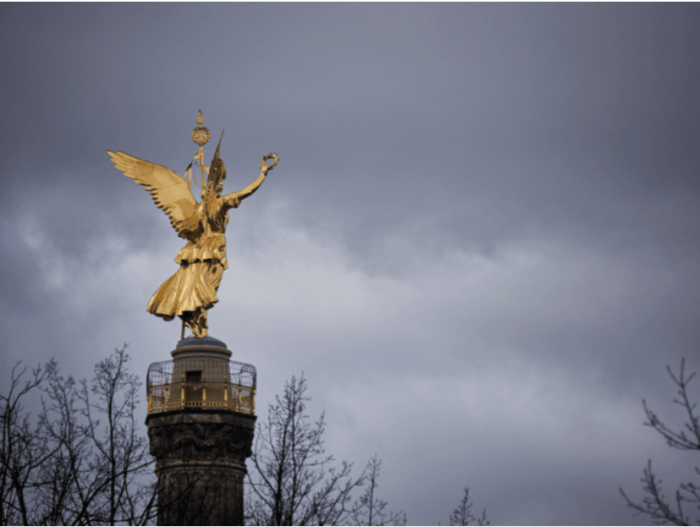We teamed up with the Unknown History podcast on Quick and Dirty Tips to bring you their latest series based on Giles Milton’s Checkmate in Berlin. Read on for more about Episode 2, covering the Soviet occupation of Berlin on April 30, 1945, which sent a powerful message to the Allied forces. If the Americans and British were going to enter the city, it would now be on terms set by Joseph Stalin.
Warning: This episode deals with sexual assault. The descriptions of historic events may be triggering for some readers or listeners.
Soviet forces advanced with lightning speed since launching their offensive against Berlin in the third week of April. Two huge army groups were converging on the city from the south and east, while a third was wheeling in from the north.
On Friday, April 20, 1945, Hitler’s 56th birthday, Marshal Zhukov’s one-and-a-half-million-strong army had begun shelling the city center from its positions in the northern suburbs, while Marshal Ivan Konev’s forces were approaching the city’s southern outskirts. The Red Army had soon encircled the German forces that remained in the city, trapping the beleaguered defenders.
When the Russians finally arrived in the city center around April 28, they terrified the civilians who were cowering in their cellars. The door to the cellar in which the Schneider family was hiding was kicked open by a booted foot and, said young Helga Schneider, “We found ourselves face to face with six Russian soldiers, all aiming submachine guns at us.” Two of them had shaven heads, three wore fur caps, and one had black curly hair and a beard that came down over his chest. The soldier with the beard asked peremptorily: “Here soldaty germanskie?”
No one responded; they were too terrified.
“Soldaty germanskie?” the soldier repeated, this time with real menace in his voice.
Young Helga’s step-grandfather managed to stammer a reply: “No soldiers here.”
The Soviet infantryman looked furious. He spat out his response. “You lie! If soldaty germanskie here, you kaput!”
The six soldiers pointed their submachine guns at the assembled group. “War kaput!” screamed one of them. “Hitler kaput!” He demanded the watches of everyone in the room. “You give urri or you kaput!”
Everyone handed over their watches, and then the soldiers left.
But shortly afterward, two very different Soviet soldiers burst into the cellar. Drunk and heavily armed, they snarled at the terrified occupants before turning to the two teenage girls, sixteen-year-old Gudrun and fourteen-year-old Erika. “You, Fräulein! You gut! You come with me!”
Gudrun’s mother protested and was kicked in the stomach. Erika’s mother begged to take her daughter’s place and was beaten unconscious.
Young Helga Schneider buried her face in a jacket and opened her eyes only when it was all over and the soldiers had left. Gudrun was carried to a camp bed. “She was trembling, her teeth were chattering, and her eyes were wide and staring.” Erika, feeble from acute tuberculosis, was in an even worse state. She had begun to hemorrhage, and no one was able to stanch the flow of blood. “She gripped her mother’s hand and kissed it. But the kiss stiffened and she died biting her mother’s fingers.”
Even closer to the city center, at the Elisabeth Hospital on Lutzowstrasse, nurse Kaethe Eckstein glanced out the window and saw the muzzle flares of approaching Russian artillery. “There were fearful screams from the rear wing of the hospital. I heard shots and hand grenades going off. I rushed out into the corridor.” The sight was one she would never forget: “Wounded men with their bandages falling from them were dragging themselves along the corridors and crawling on all fours up the stairs, shouting, ‘The Russians are here.’”
Eckstein and her fellow nurses, all nuns, had nowhere to hide. “Most were on their knees praying. Others were running about in terror.” There was to be no escape from the sexual violence now unleashed upon them. “Everywhere there were Russians dragging away nurses or female patients, pulling off their clothes, pouring whisky over them, shooting at the wall.”
To learn more about the history of World War II, visit Unknown History on Quick and Dirty Tips. Or, you can listen to the podcast below.

